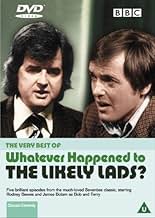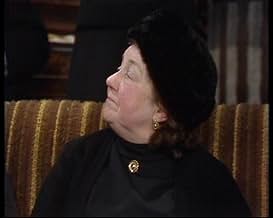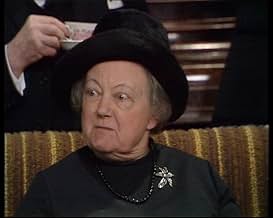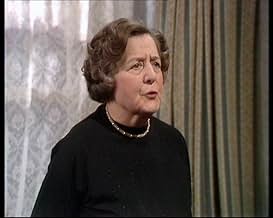Whatever Happened to the Likely Lads?
- Serie de TV
- 1973–1974
- 30min
CALIFICACIÓN DE IMDb
7.8/10
1.4 k
TU CALIFICACIÓN
Agrega una trama en tu idiomaReturning from the Army, Terry finds his best mate Bob is marrying Thelma, Terry's former partner. Their lives intertwine as Terry reintegrates, challenging the relationships between the thr... Leer todoReturning from the Army, Terry finds his best mate Bob is marrying Thelma, Terry's former partner. Their lives intertwine as Terry reintegrates, challenging the relationships between the three.Returning from the Army, Terry finds his best mate Bob is marrying Thelma, Terry's former partner. Their lives intertwine as Terry reintegrates, challenging the relationships between the three.
- Ganó 1 premio BAFTA
- 1 premio ganado y 1 nominación en total
Explorar episodios
Opiniones destacadas
These two seasoned series followed up on the exploits of the lads five years after they were last seen together. It ran from 1972-1974 but what was different from the original series was that Robert Ferris had moved off the shop floor and worked for his fiancés father as a white-collar executive building houses in the north-east. In addition, he'd moved out of his parent's place and purchased a two up two down in an upscale housing estate with a car to boot.
By contrast Terry Collier came back to his hometown after spending five years in the army, embittered by a failed marriage and resentful at missing out on the swinging 60's and permissive society of his beloved north-east. Therefore, the episodes mostly centered round Terry coming to terms with how his hometown had changed and how everybody else had changed too. He stubbornly clung to his working-class ideas and refused to conform to the early 1970's and took a sneering view towards Bob's newfound status and his engagement to Thelma. Terry was consistently coming in between Thelma and Bob trying to turn the clock back and rekindle days gone by with things like, boy's night out. This was not to say Bob himself didn't miss the old days as it didn't take much effort to lead him astray. It was hilarious at the same time watching him try to get Terry to change his ways, responsibility was not in his vocabulary. This led to some great story lines and some great laughs. The early 1970's was considered the beginning of the golden age of situational comedy and this BBC comedy is still a gem to watch. To pull this off you have to have good story lines, good scripts great dialogue between the characters and good actors to play the part and the creators of this certainly hit the sweet spot with this series. It ran a respectable two seasons was followed up by a great Christmas special at the end of 1974 and a film released in 1976 which was not bad, but it had a melancholy feel to it. There was great on screen chemistry between the two lead characters whether both having a laugh and reminiscing about the old days or else were at each others throats.
I can't finish this without commenting about the rift or the falling out between the two actors in real life. I have no insight or knowledge but my feeling is that James Bolan really didn't care for Rodney Bewes either as an actor or a person. Whether this went back to the earlier series or just boiled up during the run in the 1970's it's difficult to say. But when you work together for the best part of four years which included a BBC radio adaption of the series as well as doing commercials for ITV, that could easily test people's patience and staying power. When the series wrapped up James Bolan's next project was "When the Boat Comes In" a serious drama where the character he played was so far removed from Terry Collier you get the impression that he wanted to get as far away from his association with Rodney Bewes as quickly as possible. Bolan would return to comedy in the late 1970's in "for only when I laugh" where he played a bit of a slacker and followed up in other comedies as well as other serious dramas over his career. There never was a reunion which was a shame, because by the 2000's the die had been cast, it was too long after the 1970's for them to be pressured into another series or even a one-off comedy special, but it would have been a great salute and tribute to the fans of the series.
I would highly recommend this series as walk down memory lane at a time when people could laugh at everything and recommend it for younger people that appreciate good quality comedy at work.
By contrast Terry Collier came back to his hometown after spending five years in the army, embittered by a failed marriage and resentful at missing out on the swinging 60's and permissive society of his beloved north-east. Therefore, the episodes mostly centered round Terry coming to terms with how his hometown had changed and how everybody else had changed too. He stubbornly clung to his working-class ideas and refused to conform to the early 1970's and took a sneering view towards Bob's newfound status and his engagement to Thelma. Terry was consistently coming in between Thelma and Bob trying to turn the clock back and rekindle days gone by with things like, boy's night out. This was not to say Bob himself didn't miss the old days as it didn't take much effort to lead him astray. It was hilarious at the same time watching him try to get Terry to change his ways, responsibility was not in his vocabulary. This led to some great story lines and some great laughs. The early 1970's was considered the beginning of the golden age of situational comedy and this BBC comedy is still a gem to watch. To pull this off you have to have good story lines, good scripts great dialogue between the characters and good actors to play the part and the creators of this certainly hit the sweet spot with this series. It ran a respectable two seasons was followed up by a great Christmas special at the end of 1974 and a film released in 1976 which was not bad, but it had a melancholy feel to it. There was great on screen chemistry between the two lead characters whether both having a laugh and reminiscing about the old days or else were at each others throats.
I can't finish this without commenting about the rift or the falling out between the two actors in real life. I have no insight or knowledge but my feeling is that James Bolan really didn't care for Rodney Bewes either as an actor or a person. Whether this went back to the earlier series or just boiled up during the run in the 1970's it's difficult to say. But when you work together for the best part of four years which included a BBC radio adaption of the series as well as doing commercials for ITV, that could easily test people's patience and staying power. When the series wrapped up James Bolan's next project was "When the Boat Comes In" a serious drama where the character he played was so far removed from Terry Collier you get the impression that he wanted to get as far away from his association with Rodney Bewes as quickly as possible. Bolan would return to comedy in the late 1970's in "for only when I laugh" where he played a bit of a slacker and followed up in other comedies as well as other serious dramas over his career. There never was a reunion which was a shame, because by the 2000's the die had been cast, it was too long after the 1970's for them to be pressured into another series or even a one-off comedy special, but it would have been a great salute and tribute to the fans of the series.
I would highly recommend this series as walk down memory lane at a time when people could laugh at everything and recommend it for younger people that appreciate good quality comedy at work.
10plan99
Very few sitcom sequels are better than the first series, and the first series of this was great, but this one is. Bob's social climbing and Terry's determination to stay working class has plenty of comedy opportunities in it and all three main characters are very well cast.
The theme tune is brilliant as are the starting and ending sequences. Bob and Thelma's house is still standing and I wonder if any fans hang about outside and take pics of it.
One of the best ever UK TV sitcoms which cannot be recommended highly enough. It's a comedy must watch, being repeated on TV now, on "that'sTV", 150 on Virgin.
The theme tune is brilliant as are the starting and ending sequences. Bob and Thelma's house is still standing and I wonder if any fans hang about outside and take pics of it.
One of the best ever UK TV sitcoms which cannot be recommended highly enough. It's a comedy must watch, being repeated on TV now, on "that'sTV", 150 on Virgin.
I am in the process of watching re-runs of this on Yesterday and have always loved it, the comedy is so well observed and it just doesn't seem to date at all. Bob and Terry are characters that we can all identify with, we were one of them back in the day, my brother was certainly Bob and I was Terry! Dick Clement and Ian La Frenais' finest work, and that is saying something!
UK TV is in forever love with repeats of "classic comedies" to the extent that on Christmas Day, the BBC found room on the schedules for an ancient episode of "Dad's Army" and gave whole themed evenings to the likes of Ronnie Corbett and "The Good Life", all of which are as about as funny as a hip-transplant. But tucked away on Channel 5 was the Christmas Special from 1974 of the best situation comedy ever to grace the BBC, the superb "Whatever Happened To The Likely Lads", starring Rodney Bewes and James Bolam, written by genre-masters Dick Clement & Ian La Frenais ("Porridge", "Auf Weiderschien Pet").
While this Christmas edition is exceptionally funny and what actually prompted me to post this, I well remember that the standard of writing and acting was almost as strong spread over the two or three series they hung around for.
Unlike so many of the other so-called classic sit-coms, some of which I've mentioned above, the eponymous "Likely Lads" are wholly grounded in real-life, dealing with everyday situations, talking in everyday language. Thus there's no need to insert the cartoony outrageous characters so beloved of the Perry/Croft or Esmond and Larbey teams. These were two blokes that you could relate to who could be sat just a few seats up from you in the pub or at the football. The humour is less about the situation than the priceless dialogue, so sharp, barely a word wasted.
There's no artificiality in the setting, very obviously a run-down, depressed Newcastle or in the accents they employ. More than this though, they represent the working-class everyman muddling through life, dealing with the mundane, occasionally falling out with one another but being mates, always falling back in again.
The acting is superb, Bewes never better as the middle-class, socially upward aspirant Bob, Bolam in the only role in which I can watch him, as the down-at-heel feckless Terry and Brigit Forsyth a perfect foil for both as Bob's hoity-toity wife who comes between them.
But it really is more about the writing and time after time Clement and LaFrenais showed a winning empathy with character and the ability to get laughs out of the depiction of ordinary situations. "Porridge" and "Auf Wiederschien" are great too but this is their finest creation and in this Christmas episode, very possibly their best ever hour. Great, nostalgic theme-tune too, co-written by LaFrenais - a record of it even made the lower reaches of the pop-charts at the time
While this Christmas edition is exceptionally funny and what actually prompted me to post this, I well remember that the standard of writing and acting was almost as strong spread over the two or three series they hung around for.
Unlike so many of the other so-called classic sit-coms, some of which I've mentioned above, the eponymous "Likely Lads" are wholly grounded in real-life, dealing with everyday situations, talking in everyday language. Thus there's no need to insert the cartoony outrageous characters so beloved of the Perry/Croft or Esmond and Larbey teams. These were two blokes that you could relate to who could be sat just a few seats up from you in the pub or at the football. The humour is less about the situation than the priceless dialogue, so sharp, barely a word wasted.
There's no artificiality in the setting, very obviously a run-down, depressed Newcastle or in the accents they employ. More than this though, they represent the working-class everyman muddling through life, dealing with the mundane, occasionally falling out with one another but being mates, always falling back in again.
The acting is superb, Bewes never better as the middle-class, socially upward aspirant Bob, Bolam in the only role in which I can watch him, as the down-at-heel feckless Terry and Brigit Forsyth a perfect foil for both as Bob's hoity-toity wife who comes between them.
But it really is more about the writing and time after time Clement and LaFrenais showed a winning empathy with character and the ability to get laughs out of the depiction of ordinary situations. "Porridge" and "Auf Wiederschien" are great too but this is their finest creation and in this Christmas episode, very possibly their best ever hour. Great, nostalgic theme-tune too, co-written by LaFrenais - a record of it even made the lower reaches of the pop-charts at the time
"Whatever Happened to the Likely Lads" is a continuation of the lives and friendship between Northern lads Terry and Bob. Like the best of British sitcoms, the humour is derived from character and from situations. The scripts are excellent on the whole and James Bolam and Rodney Bewes vividly brought their respective characters to life. Broadcast in 1973 and 1974, this series became immensely popular and spawned a feature film which wasn't so good. It is a bit of a pity that the two leading actors had a falling out. Bolam accused Bewes of revealing something about the former's private life and has refused to speak to or to have anything more to do with him. The events of this sitcom pick up five years after the original series came to an end. Terry has returned home after being overseas in the army. Bob has bought his first home and is about to settle down into married life. Their reunion occurs by accident onboard the same train in the opening episode and the story lines developed from there. Terry feels rather out of step with everything in his home town as a lot has changed. His old haunts are no longer in existence and he seems to be against anything in the way of progress. Terry's lack of ambition, his ignorance and hypocrisy are amongst the sources of laughter that is effortlessly delivered by both the actors and the writers. A classic of British comedy.
¿Sabías que…?
- TriviaIn interviews in his final years Rodney Bewes would often claim that James Bolam had vetoed repeats of the series. The reality, however, was that, since the series finished its run in 1974, episodes from both versions of the sitcom had been repeated on BBC One or Two in 1975, 1977, 1980, 1981, 1982, 1985, 1986, 1989, 1992, 1993, 1994, 1995, 1996, 1997, 1998, 2000, 2001, 2002 and 2004, plus 2013 and 2015, in addition to countless re-runs on the satellite channels, as well as numerous repeats of the BBC radio adaptations, and have remained an option in terms of subsequent mainstream repeats. Bolam also said he never had any power to veto repeats, even if he had wanted to.
- Citas
Terry Collier: [Whenever he gets asked about his war wound] I never talk about it.
- ConexionesFeatured in Laughter in the House: The Story of British Sitcom (1999)
- Bandas sonorasWhatever Happened to You
(uncredited)
Composed by Mike Hugg and Ian La Frenais
Performed by Tony Rivers as Highly Likely
[series theme tune]
Selecciones populares
Inicia sesión para calificar y agrega a la lista de videos para obtener recomendaciones personalizadas
- How many seasons does Whatever Happened to the Likely Lads? have?Con tecnología de Alexa
Detalles
Contribuir a esta página
Sugiere una edición o agrega el contenido que falta

Principales brechas de datos
By what name was Whatever Happened to the Likely Lads? (1973) officially released in Canada in English?
Responda



























